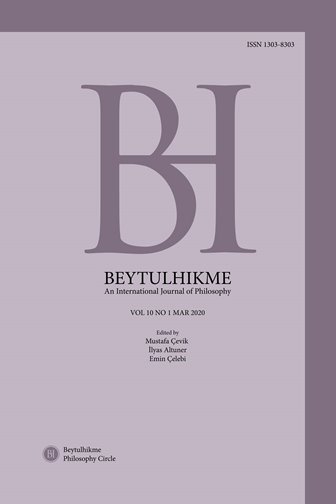Author :
Abstract
Bu makalede Drengson bazı teknoloji ve felsefe tipolojileri geliştirmektedir. Önce o, “felsefe” hakkında mümkün olan dört anlayışı ortaya koyar ve felsefenin en iyi şekilde “kavramlarla icra edilen bir tür caz müziği"gibi anlaşılması gerektiğini savunur. Daha sonra, teknolojik gelişmenin dört aşamasını şöyle adlandırır: Teknolojik anarşi, teknofili, teknofobi ve uygun teknoloji. Bunlar arasına bir sınır çekerken kullandığı temel kriter ise teknolojinin her bir aşamasında insanoğlunun baskın tavrıdır. Teknolojik anarşi, teknik imkânların henüz keşfedildiği ve baskın bir standardın mevcut olmadığı için ne olsa gider misali oynaktır. Teknofili, teknoloji aşkıdır ve bazı durumlarda teknoloji ile özdeşleşir. Bu aşamada, bir aşk hikâyesinin ilk günlerinde olduğu gibi, insan çoğunlukla teknolojinin sorunlarını, sınırlarını ve kötü yanlarını fark edemez. Doug Browning tarafından ifade edildiği gibi “taklit” iyi bir teknofili örneğidir. Teknofobi, teknolojiden korkma ve nefret etmedir. O, teknolojinin olumsuz yanlarıyla ilgili olarak düşünüp tartışılmış bir farkındalığın ötesine geçer ve reddetmeye doğru bir eğilim gösterir. Dreng-son’ın kendi kendini eleştirme aşaması ve tutumu olarak uygun teknolojiyi (insanın) en olgun ve felsefi olarak en zengin tavrı sayar. Uygun teknoloji, bizleri, bütün maliyetleri dengelemeye, biyolojik çeşitliliği korumaya, insan, hayvan ve teknoloji arasındaki karşılıklı dost etkileşimi artırmaya ve insanî gelişimi desteklemeye zorlar. Bu görüş, sürdürülebilir kalkınma ve sürdürülebilir ya da yeşil mühendislik ve tasarımın mevcut programlarının anlam ve amaçlarının çoğunu gösterir.
Keywords
Abstract
In this essay, Drengson develops some typologies of technology and philosophy. He first presents four possible understandings of "philosophy" and argues that philosophy is best understood as "a sort of jazz played with concepts." He further identifies four stages of technological development: Technological anarchy, technophilia, technophobia, and appropriate technology. The central criterion of demarcation is the dominant human attitude toward technology in each stage. Technological anarchy is a playful, anything goes stage, when the possibilities of technology are explored and when there is no dominant standard. Technophilia is the love of, and in some cases identification with technology. In this stage, as in the early stages of a love affair, one often will not notice the downsides, limits, and problems of technology. The "personation" discussed by Doug Browning is a good example of technophilia. Technophobia is a fear or hatred of technology. It goes beyond a reasoned awareness of negative effects and tends toward rejection. Dreng-son argues that appropriate technology, as a self-critical stage and attitude, is the most mature and philosophically rich. Appropriate technology urges us to balance all costs, maintain biodiversity, promote benign interactions between humans, non-human animals, and technology, and to promote human development. This view captures many of the insights and goals of current programs of sustainable development and sustainable, or green, engineering and design.
Keywords
- Barrett, W. (1978). The Illusion of Technique: A Search for Meaning in a Technological Civilization. New York: Anchor Press.
- Boulding, K. E. (1965). The Meaning of the 20th Century: The Great Transition. New York: Harper & Row.
- Commoner, B. (1972). The Closing Circle: Nature, Man and Technology. New York Bantam Books.
- Commoner, B. (1976). The Poverty of Power. New York: Knopf Doubleday.
- Dunn, P. D. (1978). Appropiate Technology: Technology with a Human Face. New York: Schocken Books.
- Durban, P. T. (Ed.) (1978-83). Research in Philosophy and Technology. 6 vols. Green- wich: JAI Press.
- Ellul, J. (1964). The Technological Society. New York: Vintage Books.
- Fromm, E. (1968). The Revolution of Hope: Toward a Humanized Technology. New York: Bantam Books.
- Galbraith, I. K. (1967). The New Industrial State. New York: Signet Books.
- Heidegger, M. (1977). The Question Concerning Technology and Other Essays. New
- Illich, I. (1973). Tools for Conviviality. New York: Harper & Row.
- Jantsch, E. (1975). Design for Evolution. New York: George Braziller.
- Lovins, A. B. (1977). Soft Energy Paths: Toward a Durable Peace. Cambridge: Ball- inger Publishing.
- Mitcham, C. & Mackey, R. (Eds.) (1972). Philosophy and Technology. New York: Free Press.
- Mumford, L. (1967). The Myth of the Machine 1: Technics and Human Development. New York: Harcourt Brace.
- Mumford, L. (1970). The Myth of the Machine 2: The Pentagon of Power. New York: Harcourt Brace.
- Odum, E. (1971). Fundamentals of Ecology. Philadelphia: W. B. Saunders.
- Papanek, V. (1973). Design for the Real World. New York: Bantam Books.
- Roszak, T. (1978). Personal Planer. New York: Anchor Press.
- Schumcher, E. F. (1973). Small Is Beautiful: Eanomics As If People Mattered. New
- Shepard, P. & McKinley, D. (Eds.) (1969). The Subversive Science: Essays Towards an Ecology of Man. New York: Houghton Mifflin.
- Stavrianos, L. S. (1976). The Promise of the Coming Dark Age. San Francisco: W. H. Freeman.
- Tawney, R. H. (1948). The Acquisitive Society. New York: Harvest Books.
- Watt, J. (1974). The Titanic Effect. Stanford: Senaur and Associates.
- Weizenbaum, J. (1976). Computer Power and Human Reason. San Francisco: W. H.
- Wilber, K. (1977). The Spearum of Consciousness. Wheaton: Quest Books.
- derginin Yaz 1982 sayısında 103-117 sayfaları arasında yayımlanmış, sonra Craig Hanks edi-
- Blackwell Yayınevi tarafından 2010 yılında bastırılan kitabın 26-37 sayfaları arasında ikinci





